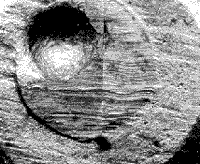Drugfire is a multimedia database imaging system that automates the comparison of images of bullet cartridge cases, shell casings and bullets that was developed by MSI (Mnemonic System Inc.).[1] It is a multimedia database imaging system that allows examiners from across the United States to compare and link evidence obtained in the form of spent cartridges and other ammunition casings.[2]

Development
Before Drugfire was invented, firearm examiners had to rely on a technique devised in the 1920s to compare ammunition markings. This involved looking at a casing under a microscope and the examiner had to compare the two casings to see if there were similar markings on the bullet which would most likely mean that the bullets had been fired from the same gun.[3]
From the years of 1991 and 1992, MSI devolved Drugfire, a forensic imaging system that allows investigators to compare ammunition markings from a specific shooting to databases of seemingly unrelated shootings which allowed the FBI to solve numerous cases.[4]
Notable cases
Drugfire was used by the Oakland Police to solve the murder of Tommie Cain. A month after Cain's shooting death, an Oakland patrol officer pulled over Jovan Reynolds and Henry Bruce for a routine traffic stop. The officer found a .38-caliber revolver in the car, which he took into evidence as both men were felons. When the gun was test-fired and entered into the Drugfire system, police found that its bullet matched the slug that had come from Cain's body. With the information, Reynolds and Bruce were questioned and eventually confessed to the murder. Police investigators said the case would most likely still had been open if not for the use of Drugfire.[5]

References
- ↑ Roach, Ronald. "Drugfire and IBIS help lawmen fight bad guys" May 19, 1997 Washington Business Journal. Retrieved on February 5, 2008 -
- ↑ Roach, Ronald. "Drugfire and IBIS help lawmen fight bad guys" May 19, 1997 Washington Business Journal. Retrieved on February 5, 2008 -
- ↑ Roach, Ronald. "Drugfire and IBIS help lawmen fight bad guys" May 19, 1997 Washington Business Journal. Retrieved on February 5, 2008 -
- ↑ "FBI and ATF are building databases of 'gun prints' that can trace bullets back to the guns that fired them". Archived from the original on 2008-01-13. Retrieved 2008-02-05. Retrieved on February 5th 2008 - How Drugfire allowed numerous unrelated cases to be linked and solved
- ↑ "FBI and ATF are building databases of 'gun prints' that can trace bullets back to the guns that fired them". Archived from the original on 2008-01-13. Retrieved 2008-02-05. Retrieved on February 5th 2008 - Info about the Murder of Tommie Cain and how Drugfire helped solve the case